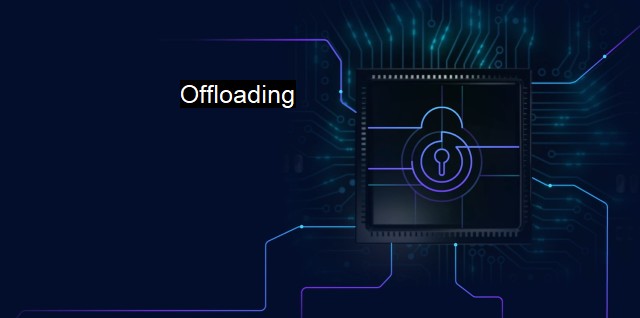What is Offloading?
Maximizing Cybersecurity Performance: The Benefits of Offloading Processing Tasks from CPU
'offloading' refers to a strategic optimization methodology used to reduce the workload imposed by security processes on a system. The aim is to facilitate smoother and faster operations without compromising the security of a system.The accelerating sophistication and scale of cyber threats require PCs, servers, and other devices to utilize security applications. These applications, especially those encompassing firewalls and antivirus programs, often take up considerable processing resources to complete intensive tasks of data protection, such as inspections, scanning, or updates. As a result, the performance of systems may be hampered due to the taxing security demands put on their processing capabilities. Offloading comes into the scenario as a resolution to this issue, transferring a segment of the computing obligations of security applications to external devices or services.
One prevalent offloading technique is shifting antivirus scanning tasks to dedicated servers. Regular, comprehensive scanning of hard drives or networks scrapes off significant system resources. By offloading this task to a dedicated server, resources of the original computer are freed up, allowing for unencumbered operations. The scanning server holds the responsibility of looking for threats and when identified, notifies the user. The results of this action can be a substantial improvement in system performance.
Another widespread approach for offloading in cybersecurity is cloud offloading. Cloud computing, intrinsically built on robust and powerful machines, is used to shoulder some of the burdens that originally were meant for local devices. When cybersecurity tasks are moved to the cloud, it not only relinquishes on-premise systems but also beefs up the security. The cloud holds an inherent advantage of its substantial resources and the expertise to cope with extensive and contemporary space of threats.
The cybersecurity industry also leverages specialized hardware for offloading. Integrated circuitry like ASIC, FPGA, or the Network Processing Unit (NPU) are engineered to handle specific tasks. They relieve the main CPU from the demanding tasks of packet inspection and VPN encryption by performing them independently. When these specification-rich components are incorporated into a system, real-time security measures perform without taking a toll on the system's performance.
Offloading also plays a significant role in mobile devices utilizing their battery power in a more efficient way. Often, applications that need real-time data transmission or frequent software updates are energy-hungry and profoundly influence battery life. Vital methods, like computation offloading and data offloading, are adopted to optimize the power utilization and extend the battery life, indirectly contributing to cybersecurity by reducing the potential vulnerability of compromised devices induce.
While offloading significantly reduces load and increases performance, it also introduces a new set of challenges to be addressed. outsourcing antivirus scanning tasks to a server could expose sensitive data unless carefully handled. Likewise, utilizing the cloud to offload tasks also necessitates a robust security strategy to protect against inherent risks such as vulnerability to breaches, injecting faulty virtual machines, or malicious insiders attack.
Offloading is a multifaceted concept in the cybersecurity industry that balances security requirements and system performance through shifting significant security workloads away from devices. While zones of risk are generated while practicing offloading, merging cybersecurity and offloading approaches can enact protective shortstops to negate potential threats. Therefore, offloading becomes an evolving and elemental aspect of an effective cybersecurity strategy by combining improved performance, better use of resources, and enhanced security.

Offloading FAQs
What is offloading in the context of cybersecurity and antivirus?
Offloading in the context of cybersecurity and antivirus refers to the process of transferring or outsourcing some of the compute-intensive tasks from the local device or network to a third-party service provider. This can help in improving the performance and efficiency of the local system, as well as augmenting its security capabilities.Which type of security tasks can be offloaded to a third-party service provider?
Typically, security tasks such as malware analysis, threat intelligence, network monitoring, security information and event management (SIEM), and data analysis can be offloaded to a third-party service provider. This can help in reducing the local workload, minimizing the risk of false positives, and ensuring timely and accurate detection and response to security incidents.What are the benefits of offloading in cybersecurity and antivirus?
Offloading can offer several benefits in cybersecurity and antivirus, including improved performance and efficiency of local systems, enhanced security capabilities, reduced costs and complexities of maintaining an in-house security infrastructure, and access to specialized expertise and advanced technologies. It can also help in scaling up or down the security infrastructure as per the changing needs of the organization.What are the potential risks and challenges of offloading in cybersecurity and antivirus?
Offloading in cybersecurity and antivirus can also pose several risks and challenges, such as potential loss of control over the security infrastructure, increased dependency on third-party service providers, compliance and regulatory issues, integration and interoperability challenges, and data privacy and security concerns. It is important to choose the right service providers, establish clear agreements and service level agreements (SLAs), and implement adequate oversight and monitoring mechanisms to mitigate these risks and challenges.| | A | | | B | | | C | | | D | | | E | | | F | | | G | | | H | | | I | | | J | | | K | | | L | | | M | |
| | N | | | O | | | P | | | Q | | | R | | | S | | | T | | | U | | | V | | | W | | | X | | | Y | | | Z | |
| | 1 | | | 2 | | | 3 | | | 4 | | | 7 | | | 8 | | |||||||